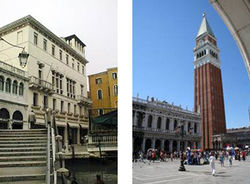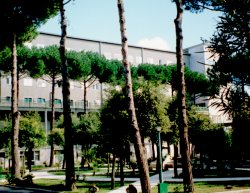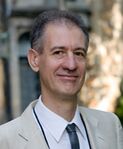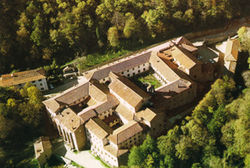Enoch Seminar (2001-), learned society




The Enoch Seminar is an academic group of international specialists in Second Temple Judaism and Christian Origins, who share the results of their research in the field and biennially meet to discuss topics of common interest.
History
Founded in 2001 by Gabriele Boccaccini, the Enoch Seminar focuses on the period of Jewish history, culture and literature from the Babylonian Exile to the Bar-Kochba revolt—the period in which both Christianity and Rabbinic Judaism have their roots. The goal is to tear down the misleading walls of separation that still divide this field of research, recovering the unity and integrity of the period. Enoch is the symbol of this inter-canonical and inter-disciplinary effort, as he is present of each and all the canons that anachronistically divide sources from the period: Old Testament, Apocrypha, Pseudepigrapha, Dead Sea Scrolls, Jewish-Hellenistic literature, New Testament, Apostolic Fathers, etc.
Participation at the Enoch Seminar is by invitation only and is restricted to University professors and specialists in Second Temple Judaism and Christian Origins who have completed their PhD. To graduate students and PhD candidates, the Enoch Seminar offers a biennial meeting (the Enoch Graduate Seminar).
The Enoch Seminar is chaired by Gabriele Boccaccini (University of Michigan) and is made possible by fundings from the University of Michigan and from the Michigan Center for Early Christian Studies and the Alessandro Nangeroni International Endowment.
Meetings and Proceedings
- 2001 (Florence, Italy) - First Enoch Seminar: The Origins of Enochic Judaism
- 2003 (Venice, Italy) - Second Enoch Seminar: Enoch and Qumran Origins
- 2005 (Camaldoli, Italy) - Third Enoch Seminar: Enoch and the Messiah Son of Man
- 2007 (Camaldoli, Italy) - Fourth Enoch Seminar: Qumran and the Mosaic Torah
- 2009 (Naples, Italy) - Fifth Enoch Seminar: Enoch, Adam, Melchisedek: Mediatorial Figures in 2 Enoch
- 2011 (Milan, Italy) - Sixth Enoch Seminar: 2 Baruch, 4 Ezra: Late First Century Apocalypticism
- 2013 (Camaldoli, Italy) - Seventh Enoch Seminar: Enochic Influences on the Synoptic Gospels
- 2015 (Milan, Italy) - Eighth Enoch Seminar
Meetings of the Enoch Graduate Seminar (2006-)
- 2006 (Ann Arbor, MI) - First Enoch Graduate Seminar
- 2008 (Princeton, NJ) - Second Enoch Graduate Seminar
- 2010 (July 19-23; Budapest, Hungary) - Third Enoch Graduate Seminar
- 2012 (Notre Dame, IN) - Fourth Enoch Graduate Seminar
- 2014 (Montreal, Canada) - Fifth Enoch Graduate Seminar
- 2016 (Austin, TX) - Sixth Enoch Graduate Seminar
...
Enoch Seminar Nangeroni Meetings (2012-)
- 2012 (Milan, Italy) - First Nangeroni Meeting: "The Seleucid and Hasmonean Periods and the Apocalyptic Worldview"
- 2014 (Dor, Israel) - Second Nangeroni Meeting: "Voice of Jacob: Early Jewish Texts and Traditions in Christian Transmission"
- 2014 (Rome, Italy) - Third Nangeroni Meeting: "Rereading Paul as a Second-Temple Jewish Author"
- 2015 (Milan, Italy) - Fourth Nangeroni Meeting: "Early Islam: The Sectarian Milieu of Late Antiquity?"
- 2015 (Naples, Italy) - Fifth Nangeroni Meeting: "Second Temple Jewish Paideia in Its Ancient Near Eastern and Hellenistic Contexts"
Enoch Seminar Receptions at the SBL (2012-)
- 2012 (Chicago, IL) - SBL Annual Meeting
- 2013 (Baltimore, MD) - SBL Annual Meeting
- 2014 (San Diego, CA) - SBL Annual Meeting (Sunday Nov 23, 2014; Grand Hyatt-American's Cup Terrace; 8pm-9pm)
< Future Receptions: >
- 2015 (Atlanta, GA) - SBL Annual Meeting
- 2016 (San Antonio, TX) - SBL Annual Meeting
Publications from the Enoch Seminar
- Gabriele Boccaccini (ed.), The Origins of Enochic Judaism (Turin: Zamorani, 2005) [=Henoch
- Gabriele Boccaccini (ed.), Enoch and Qumran Origins: New Light on a Forgotten Connection (Grand Rapids: Eerdmans, 2005)
- Gabriele Boccaccini (ed.), Il messia tra memoria e attesa (Brescia: Morcelliana, 2005)
- Gabriele Boccaccini (ed.), Enoch and the Messiah Son of Man: Revisiting the Book of Parables (Grand Rapids: Eerdmans, 2007)
- Gabriele Boccaccini and John J. Collins (eds.), The Early Enoch Literature (Leiden: Brill, 2007)
- Gabriele Boccaccini and Giovanni Ibba (eds.), Enoch and the Mosaic Torah: The Evidence of Jubilees (Grand Rapids: Eerdmans, 2009)
- Gabriele Boccaccini, Pierpaolo Bertalotto and Todd Hanneken (eds.), Enoch and Jubilees (Brescia: Morcelliana, 2009) [=Henoch 31.1 (2009)]
- Gabriele Boccaccini and Jason M. Zurawski (eds.), Enochic Traditions and Mediatorial Figures in Second Temple Judaism (Brescia: Morcelliana, 2011) [=Henoch 331.1 (2011)]
- Andrei A. Orlov and Gabriele Boccaccini (eds.), New Perspectives on 2 Enoch: No Longer Slavonic Only (Leiden: Brill, 2012)
- Matthias Henze and Gabriele Boccaccini (eds.), 4 Ezra and 2 Baruch: Reconstruction after the Fall (Leiden: Brill, 2013)
- Gabriele Boccaccini and Jason M. Zurawski (eds.), Interpreting 4 Ezra and 2 Baruch: International Studies (Leiden: Brill, 2014)
Participants
Veterans (5+)
- Andreas Bedenbender (2001-ES; 2003-ES; 2005-ES; 2007-ES; 2009-ES; 2011-ES)
- Gabriele Boccaccini (2001-ES; 2003-ES; 2005-ES; 2006-GS; 2007-ES; 2008-GS; 2009-ES; 2010-GS; 2011-ES; 2012-NM)
- James H. Charlesworth (2001-ES; 2003-ES; 2005-ES; 2007-ES; 2008-GS; 2009-ES; 2011-ES)
- J. Harold Ellens (2001-ES; 2003-ES; 2005-ES; 2007-ES; 2009-ES; 2011-ES)
- Pierluigi Piovanelli (2001-ES; 2003-ES; 2005-ES; 2007-ES; 2009-ES; 2011-ES; 2012-NM)
- David W. Suter (2001-ES; 2003-ES; 2005-ES; 2007-ES; 2009-ES; 2011-ES)
- James C. VanderKam (2003-ES; 2005-ES; 2006-GS; 2007-ES; 2012-GS)
(5x) Matthias Henze -- Lester L. Grabbe - Helge S. Kvanvig -- George W.E. Nickelsburg -- Benjamin G. Wright // Esther Eshel - {Hanan Eshel}
- Albert I. Baumgarten (2005-ES; 2007-ES; 2011-ES; 2012-NM)
(4x) - Claudio Gianotto -- Daniel Assefa -- Kelley Coblentz Bautch -- Daniel Boyarin -- John J. Collins -- Lawrence H. Schiffman -- Loren T. Stuckenbruck // Ida Fröhlich - Paolo Sacchi
Members (2 to 4-time attendees)
(4x) - Claudio Gianotto -- Daniel Assefa -- Kelley Coblentz Bautch -- Daniel Boyarin -- John J. Collins -- Lawrence H. Schiffman -- Loren T. Stuckenbruck // Ida Fröhlich - Paolo Sacchi
(3x) - Darrell L. Bock -- Calum M. Carmichael -- Adela Yarbro Collins -- James R. Davila -- Devorah Dimant -- Lutz Doering -- Henryk Drawnel -- Robert A. Kraft -- Hindy Najman -- Stephen Pfann -- Jacques van Ruiten // Luca Arcari - Albert I. Baumgarten - Michael Daise - Charles A. Gieschen - Martha Himmelfarb - Michael A. Knibb - Klaus Koch - Andrei A. Orlov - Carlos A. Segovia - Eibert J.C. Tigchelaar - James C. VanderKam - Pieter Venter
(2x) - Jeff S. Anderson -- Christfried Böttrich -- Silviu Bunta -- Esther G. Chazon -- Daniel K. Falk -- Steven D. Fraade -- David R. Jackson -- John R. Levison -- William R.G. Loader -- Basil Lourié -- Jared W. Ludlow -- Eric F. Mason -- Rivka Nir -- Bilhah Nitzan -- Anders Klostergaard Petersen -- Alexander Toepel -- Johannes Tromp -- Megan Williams -- Azzan Yadin
Guidelines for Organizing an Enoch Seminar
The Enoch Seminar is meant to be a meeting of between 50-80 people (as compared to the Nangeroni Meetings which are designed to have 25-35 participants). It includes:
- 12 major paper authors - 12 major paper respondents - 24 short paper authors - Up to 6 reading sessions chairs
Organizing an Enoch Seminar is a 4-step process
- First Step: An Enoch Seminar Member(s) proposes a topic, which then must be approved by the Enoch Seminar Board of Directors.
- Timeframe: 2 years prior to date of proposed Enoch Seminar
- Second Step: The appointed chair(s) of the Enoch Seminar should gather a group of at least 5-10 colleagues, who are committed to participate in the Meeting and collaborate on its organization. At this point, an email will be sent to the Enoch Seminar members, announcing the proposal and asking those who are particularly interested in the topic to join the organization of the Meeting.
- Timeframe: 1.5 years prior to the date of the Enoch Seminar
- Third Step: The appointed chair(s) must present the final schedule, including the major authors and paper topics to the Enoch Seminar Board of Directors for final approval.
- Timeframe: 1 year prior to the date of the Enoch Seminar
- Fourth Step: The Enoch Seminar Board of Directors will announce and advertise the program and registration for the Enoch Seminar until the maximum number of participants (50-80) is reached.
- Timeframe: 8-6 months prior to the date of the Enoch Seminar

